
- •Contents
- •Thanks
- •To the student
- •To the teacher
- •3 Present continuous and present simple 1 (I am doing and I do)
- •10 Present perfect continuous and simple (I have been doing and I have done)
- •11 how long have you (been) … ?
- •12 for and since when … ? and how long … ?
- •13 Present perfect and past 1 (I have done and I did)
- •14 Present perfect and past 2 (I have done and I did)
- •15 Past perfect (I had done)
- •16 Past perfect continuous (I had been doing)
- •17 have and have got
- •18 used to (do)
- •19 Present tenses (I am doing / I do) for the future
- •20 I’m going to (do)
- •21 will and shall 1
- •22 will and shall 2
- •23 I will and I’m going to
- •24 will be doing and will have done
- •26 can, could and (be) able to
- •27 could (do) and could have (done)
- •28 must and can’t
- •29 may and might 1
- •30 may and might 2
- •31 have to and must
- •32 must mustn’t needn’t
- •33 should 1
- •34 should 2
- •35 I’d better … it’s time …
- •36 would
- •39 if I knew … I wish I knew …
- •40 if I had known … I wish I had known …
- •41 wish
- •42 Passive 1 (is done / was done)
- •43 Passive 2 (be done / been done / being done)
- •44 Passive 3
- •45 it is said that … he is said to … he is supposed to …
- •46 have something done
- •47 Reported speech 1 (he said that …)
- •48 Reported speech 2
- •49 Questions 1
- •52 Question tags (do you? isn’t it? etc.)
- •53 Verb + -ing (enjoy doing / stop doing etc.)
- •54 Verb + to … (decide to … / forget to … etc.)
- •55 Verb (+ object) + to … (I want you to …)
- •56 Verb + -ing or to … 1 (remember, regret etc.)
- •57 Verb + -ing or to … 2 (try, need, help)
- •58 Verb + -ing or to … 3 (like / would like etc.)
- •59 prefer and would rather
- •60 Preposition (in/for/about etc.) + -ing
- •61 be/get used to … (I’m used to …)
- •63 there’s no point in -ing, it’s worth -ing etc.
- •64 to … , for … and so that …
- •65 Adjective + to …
- •66 to … (afraid to do) and preposition + -ing (afraid of -ing)
- •67 see somebody do and see somebody doing
- •68 -ing clauses (He hurt his knee playing football.)
- •69 Countable and uncountable 1
- •70 Countable and uncountable 2
- •71 Countable nouns with a/an and some
- •74 the 2 (school / the school etc.)
- •75 the 3 (children / the children)
- •77 Names with and without the 1
- •78 Names with and without the 2
- •79 Singular and plural
- •80 Noun + noun (a bus driver / a headache)
- •81 -’s (your sister’s name) and of … (the name of the book)
- •82 myself/yourself/themselves etc.
- •83 a friend of mine my own house on my own / by myself
- •84 there … and it …
- •85 some and any
- •87 much, many, little, few, a lot, plenty
- •90 all every whole
- •91 each and every
- •92 Relative clauses 1: clauses with who/that/which
- •94 Relative clauses 3: whose/whom/where
- •95 Relative clauses 4: extra information clauses (1)
- •96 Relative clauses 5: extra information clauses (2)
- •97 -ing and -ed clauses (the woman talking to Tom, the boy injured in the accident)
- •98 Adjectives ending in -ing and -ed (boring/bored etc.)
- •99 Adjectives: a nice new house, you look tired
- •100 Adjectives and adverbs 1 (quick/quickly)
- •102 so and such
- •104 quite, pretty, rather and fairly
- •105 Comparative 1 (cheaper, more expensive etc.)
- •106 Comparative 2 (much better / any better etc.)
- •107 Comparative 3 (as … as / than)
- •108 Superlative (the longest / the most enjoyable etc.)
- •109 Word order 1: verb + object; place and time
- •110 Word order 2: adverbs with the verb
- •111 still any more yet already
- •112 even
- •114 in case
- •116 as (as I walked … / as I was … etc.)
- •117 like and as
- •119 during for while
- •121 at/on/in (time)
- •122 on time and in time at the end and in the end
- •123 in/at/on (position) 1
- •124 in/at/on (position) 2
- •125 in/at/on (position) 3
- •126 to, at, in and into
- •127 in/on/at (other uses)
- •129 Noun + preposition (reason for, cause of etc.)
- •130 Adjective + preposition 1
- •131 Adjective + preposition 2
- •132 Verb + preposition 1 to and at
- •134 Verb + preposition 3 about and of
- •135 Verb + preposition 4 of/for/from/on
- •136 Verb + preposition 5 in/into/with/to/on
- •137 Phrasal verbs 1 Introduction
- •138 Phrasal verbs 2 in/out
- •139 Phrasal verbs 3 out
- •142 Phrasal verbs 6 up/down
- •143 Phrasal verbs 7 up (1)
- •144 Phrasal verbs 8 up (2)
- •145 Phrasal verbs 9 away/back
- •Additional exercises
- •Study guide
- •Key to Exercises
- •Key to Additional exercises (see page 302)
- •Key to Study guide
- •Index
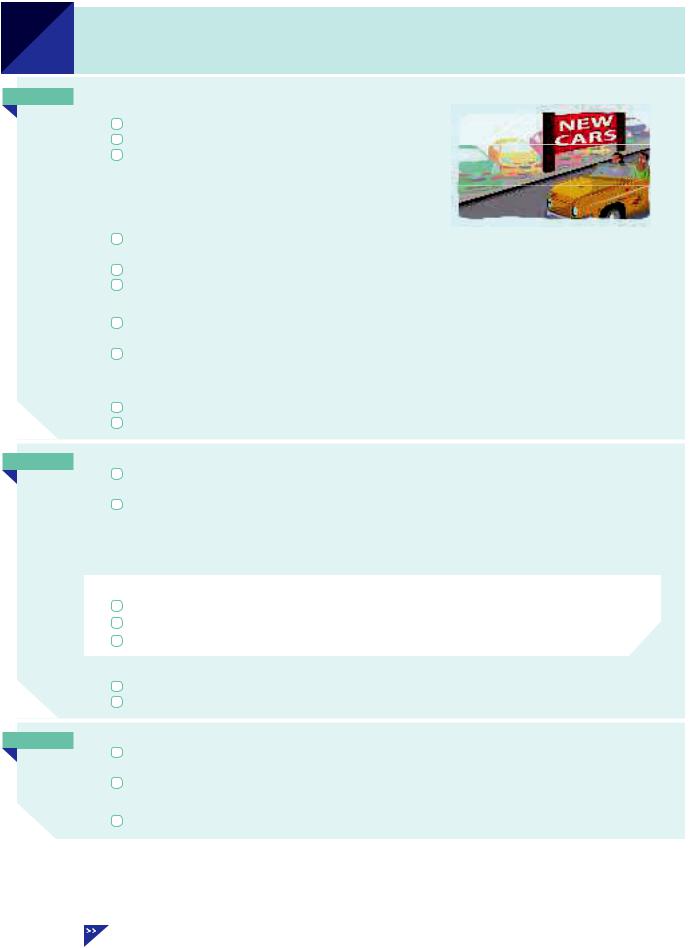
Unit
36 would
AWe use would (’d) / wouldn’t when we imagine a situation or action (= we think of something that is
not real):
It would be nice to buy a new car, but we can’t aford it.
I’d love to live by the sea.
a: Shall I tell Chris what happened?
b:No, I wouldn’t say anything.
(= I wouldn’t say anything in your situation)
We use would have (done) when we imagine something that didn’t happen in the past:
They helped us a lot. I don’t know what we’d have done without their help. (we’d have done = we would have done)
It’s a shame you didn’t see the film. You would have liked it.
I didn’t tell Sam what happened. He wouldn’t have been pleased.
Compare would (do) and would have (done):
I would call Lisa, but I don’t have her number. (now)
I would have called Lisa, but I didn’t have her number. (past)
I’m not going to invite them to the party. They wouldn’t come anyway.
I didn’t invite them to the party. They wouldn’t have come anyway.
We oten use would in sentences with if (see Units 38–40):
I would call Lisa if I had her number.
I would have called Lisa if I’d had her number.
BCompare will (’ll) and would (’d):
I’ll stay a little longer. I’ve got plenty of time.
I’d stay a little longer, but I really have to go now. (so I can’t stay longer)
I’ll call Lisa. I have her number.
I’d call Lisa, but I don’t have her number. (so I can’t call her)
Sometimes would/wouldn’t is the past of will/won’t.
Compare:
present |
past |
TOM: I’ll call you on Sunday. aMY: I promise I won’t be late.
LISa: Oh, no! The car won’t start.
→Tom said he’d call me on Sunday.
→Amy promised that she wouldn’t be late.
→Lisa was annoyed because her car wouldn’t start.
Somebody wouldn’t do something = he/she refused to do it:
I tried to warn him, but he wouldn’t listen to me. (= he refused to listen) The car wouldn’t start. (= it ‘refused’ to start)
CYou can also use would to talk about things that happened regularly in the past:
When we were children, we lived by the sea. In summer, if the weather was fine, we would all get up early and go for a swim. (= we did this regularly)
Whenever Richard was angry, he would walk out of the room.
With this meaning, would is similar to used to (see Unit 18):
Whenever Richard was angry, he used to walk out of the room.
|
will Units 21–22 would … if Units 38–40 wish … would Unit 41 would like Units 37D, 58 |
72 |
would prefer / would rather Unit 59 Modal verbs Appendix 4 |
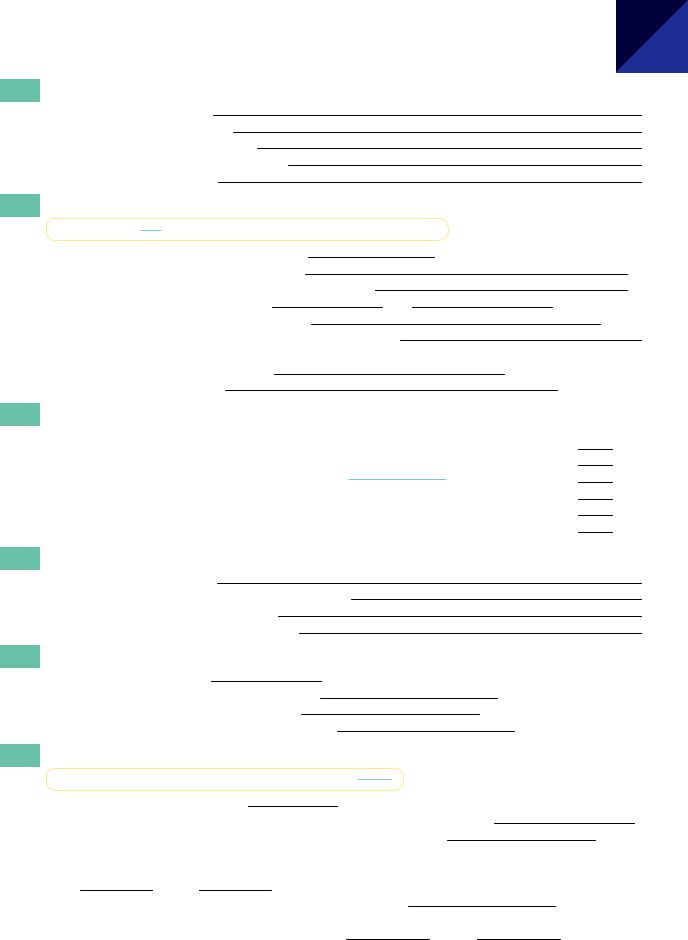
Exercises
36.1 Write sentences about yourself. Imagine things you would like or wouldn’t like.
1 (a place you’d love to live) I’d love to live by the sea. 2 (a job you wouldn’t like to do)
3 (something you would love to do)
4 (something that would be nice to have)
5 (a place you’d like to go to)
36.2Complete the sentences using would + the following verbs (in the correct form):
Unit
36
|
be |
be |
do |
do |
enjoy |
enjoy |
have |
stop |
|
1 |
They helped us a lot. I don’t know what we would have done |
without their help. |
|||||||
2 |
You should go and see the film. I think you |
|
|
it. |
|||||
3 |
It’s a pity you couldn’t come to the party last night. You |
|
it. |
||||||
4 |
Shall I apply for the job or not? What |
|
|
you |
in my position? |
||||
5 |
I was in a hurry when I saw you. Otherwise I |
|
|
to talk. |
|||||
6 |
We took a taxi home last night, but got stuck in the trafic. It |
|
|||||||
|
quicker to walk. |
|
|
|
|
|
|
||
7 |
Why don’t you go and see Clare? She |
|
|
|
very pleased to see you. |
||||
8 |
In an ideal world, everybody |
|
|
|
|
enough to eat. |
|||
36.3 Each sentence on the right follows a sentence on the let. Which follows which?
1 |
I’d like to go to Australia one day. |
|
a |
It wouldn’t have been very nice. |
1 |
c |
2 |
I wouldn’t like to live on a busy road. |
|
b |
It would have been fun. |
2 |
|
3 |
I’m sorry your trip was cancelled. |
|
c |
It would be nice. |
3 |
|
4 |
I’m looking forward to going out tonight. |
|
d |
It won’t be much fun. |
4 |
|
5 |
I’m glad we didn’t go out in the rain. |
|
e |
It wouldn’t be very nice. |
5 |
|
6 |
I’m not looking forward to the trip. |
|
f |
It will be fun. |
6 |
|
|
|
|
|
|
|
|
36.4 Write sentences using promised + would/wouldn’t.
1 I wonder why Laura is late.
2 I wonder why Steve hasn’t called me. He promised 3 Why did you tell Amy what I said? You
4 I’m surprised they didn’t wait for us. They
36.5Complete the sentences. Use wouldn’t + a suitable verb.
1 |
I tried to warn him, but he wouldn’t listen to me. |
|
2 |
I asked Amanda what had happened, but she |
me. |
3 |
Paul was angry about what I’d said and he |
to me for two weeks. |
4 |
Martina insisted on carrying all her luggage. She |
me help her. |
36.6 Complete the sentences using would (section C). Choose from these verbs:
|
forget |
shake |
share |
smile |
stay |
walk |
|
|
1 |
Whenever Richard was angry, he |
would walk |
out of the room. |
|
||||
2 |
We used to live next to a railway line. Every time a train went past, the house |
. |
||||||
3 |
Katherine was always very generous. She didn’t have much, but she |
what |
||||||
|
she had with everyone else. |
|
|
|
|
|
||
4 |
You could never rely on Joe. It didn’t matter how many times you reminded him to do something, |
|||||||
|
he |
|
always |
. |
|
|
|
|
5 |
When we were children, we used to go to the beach a lot. We |
there all day |
||||||
|
playing in the sand and swimming in the sea. |
|
|
|
||||
6 |
Lucy was always friendly. Whenever I saw her, she |
|
always |
and say hello. |
||||
Additional exercises 16–18 (pages 311–13) |
73 |
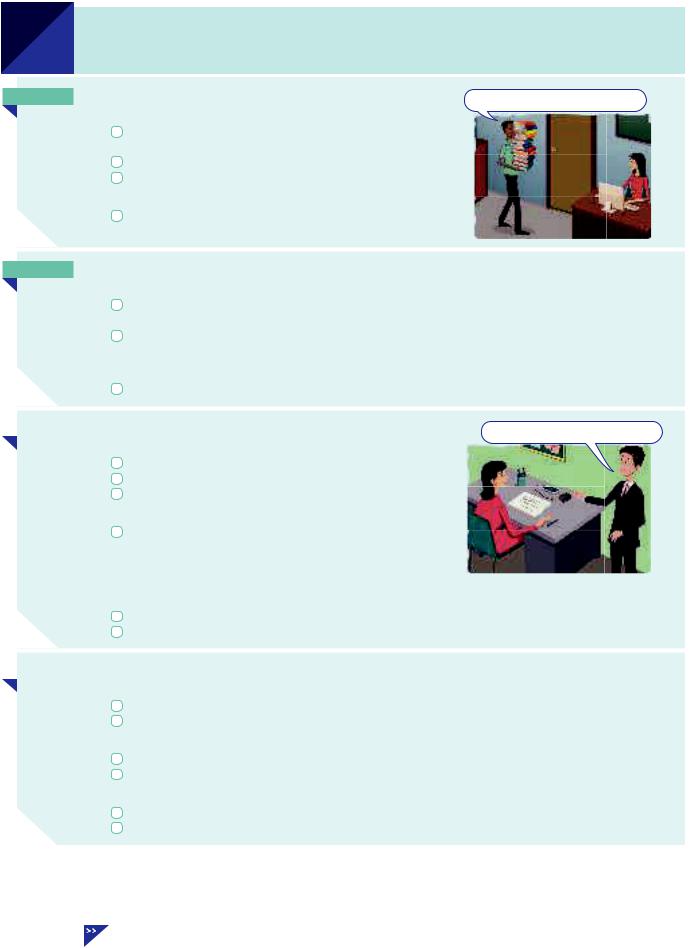
Unit
37
A
can/could/would you … ? etc.
(Requests, o ers, permission and invitations)
Asking people to do things (requests) |
Could you open the door, please? |
|
|
|
|
We use can or could to ask people to do things: |
|
|
|
Can you wait a moment, please? |
|
or |
Could you wait a moment, please? |
|
|
Helen, can you do me a favour? |
|
|
Excuse me, could you tell me how to get to the bus station? |
|
You can say Do you think you could … ? :
Do you think you could take me to the airport? (not Do you think you can)
BAsking for things
To ask for something, we use Can (I) have … ? / Could (I) have … ? or Can (I) get …?:
|
(in a shop) |
|
|
|
|
Can I have these postcards, please? |
or |
Can I get these postcards, please? |
|
|
(in a restaurant) |
|
|
|
|
Could we have the menu, please? |
or |
Can we have the menu, please? |
|
|
May I have … ? is also possible: |
|
|
|
|
May I have these postcards, please? |
|
|
|
|
Asking to do things |
|
|
|
C |
|
|
Could I use your phone charger? |
|
|
We use can I or could I to ask to do something: |
|
||
|
(on the phone) Hello, can I speak to Steve, please? |
|||
|
‘Could I use your phone charger?’ |
‘Sure.’ |
||
|
Do you think I could borrow your bike? |
|||
|
May is also possible: |
|
|
|
|
May I ask you a question? |
|
|
|
|
May is more formal than can or could. |
|
|
|
|
You can also say: |
|
|
|
|
Do you mind if I … ? |
|
|
|
|
Is it all right if I …? / Is it OK if I … ? |
|
|
|
|
Do you mind if I use your phone charger? |
|||
|
‘Is it all right if I sit here?’ |
‘Yes, of course.’ |
||
|
Ofering and inviting |
|
|
|
D |
|
|
|
|
|
You can use Can I … ? to ofer to do something: |
|
||
|
‘Can I help you?’ ‘No, it’s OK. I can manage, thanks.’ |
|||
|
‘Can I get you some cofee?’ |
‘That would be nice.’ |
||
|
To ofer or to invite, we use Would you like … ? (not Do you like): |
|||
|
‘Would you like some cofee?’ ‘No, thanks.’ |
|||
|
‘Would you like to eat with us tonight?’ |
‘That would be great.’ |
||
I’d like … (= I would like) is a polite way to say what you want:
(at a tourist information o ice) I’d like some information about hotels, please. (in a shop) I’d like to try on this jacket, please.
|
can and could Units 26–27 mind -ing Unit 53 would like Units 55A, 58B |
74 |
Modal verbs (can/could/will/would etc.) Appendix 4 |
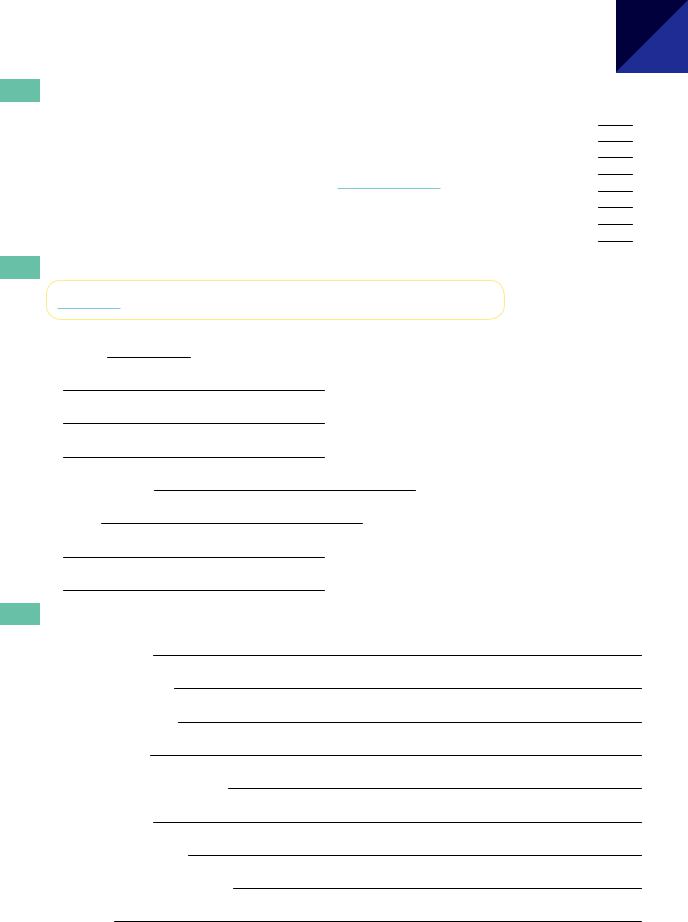
Exercises
37.1 Which goes with which?
1 |
Could you pass the sugar? |
|
a |
It depends what you want me to do. |
1 |
e |
2 |
Would you like to go to the cinema? |
|
b |
No, that’s fine. |
2 |
|
3 |
Can I use your toilet? |
|
c |
Me too. Let’s go out for a walk. |
3 |
|
4 |
Do you mind if I leave work early? |
|
d |
Sure. It’s the door on the let. |
4 |
|
5 |
Can you do me a favour? |
|
e |
Yes, here you are. |
5 |
|
6 |
Would you like something to eat? |
|
f |
No, it’s all right. I can manage, thanks. |
6 |
|
7 |
Can I give you a hand? |
|
g |
Maybe. What’s on? |
7 |
|
8 |
I’d like some fresh air. |
|
h |
No, thanks. I’m not hungry. |
8 |
|
|
|
|
|
|
|
|
37.2 Complete the sentences. Choose from:
|
I’d like |
Would you like to try |
Do you mind |
Can I take |
1 |
Can I give |
Would you like to come |
Would you like |
I’d like to |
You’re driving and you see a friend walking along the road. You stop and say: |
||||
|
Hi Joe. Can |
I give you a lit? |
|
|
2 |
You’re making a cold drink for your friend. Perhaps he wants ice. You ask: |
|||
|
|
|
ice in your drink? |
|
3 |
You’re ordering something to eat in a cafe. You say: |
|
||
|
|
|
a chicken salad, please. |
|
4 |
You have an extra ticket for a concert. Maybe your friend will come. You ask: |
|||
|
|
|
to a concert tomorrow night? |
|
5 |
You answer the phone. The caller wants to speak to Lisa. You say: |
|
||
|
Lisa’s not here. |
|
a message? |
|
6 |
You need to see a dentist. You phone for an appointment. You say: |
|||
|
Hello. |
|
make an appointment, please. |
|
7 |
You work in a shoe shop. A customer asks you about some shoes. You ask: |
|||
|
|
|
them on? |
|
8 |
You go into a cafe and see some people you know. You ask: |
|
||
|
|
|
if I join you? |
|
37.3 What would you say in these situations?
1 You’re carrying a lot of things. You can’t open the door yourself. There’s a man near the door. You say to him:
2You’ve finished your meal in a restaurant and now you want the bill. You ask the waiter:
3You’ve filled in some forms in English. You want your friend to check them for you. You ask your friend:
4The woman in the next room is playing music. It’s very loud. You want her to turn it down. You say to her:
5You’re on a train. The window is open and you’re cold. You’d like to close it. You ask the man next to you:
6You’re on a bus. You have a seat, but an elderly man is standing. You ofer him your seat. You say to him:
7You’re a tourist. You want to go to the station, but you don’t know how to get there. You ask at your hotel:
8You are in a clothes shop. You see some trousers you like and you want to try them on. You say to the shop assistant:
9You meet a very famous person. You want to get his/her autograph. You ask:
Unit
37
75
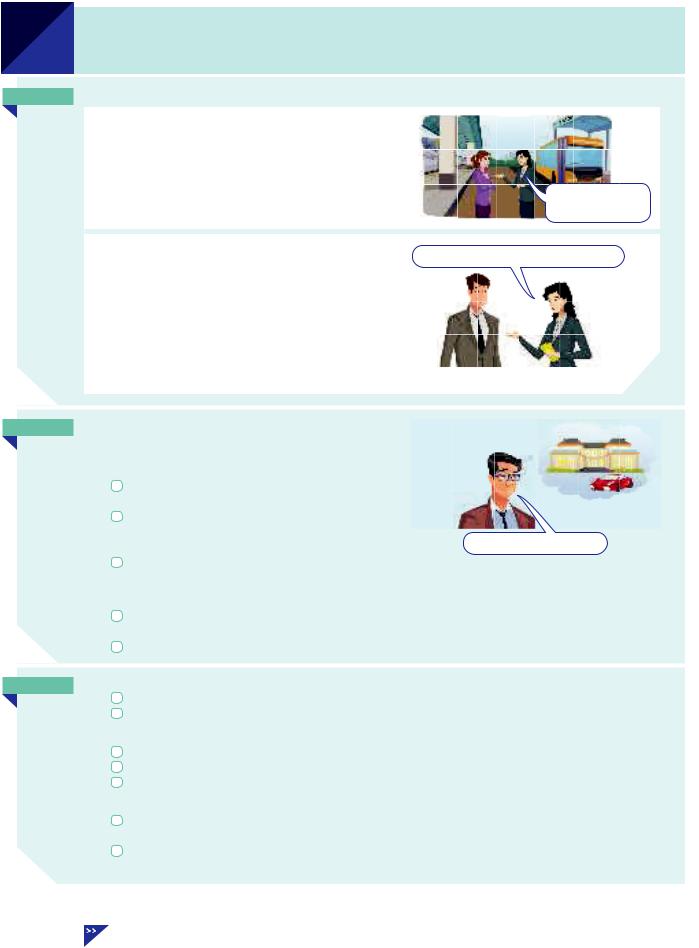
Unit
38 if I do … and if I did …
ACompare these examples:
(1)LISa: Shall we take the bus or the train? JESS: If we take the bus, it will be cheaper.
For Jess, it is possible that they will take the bus, so she says:
If we take the bus, it will be …
If we take the bus,
LISA |
JESS |
it will be cheaper. |
|
|
(2)Lisa and Jess decide to take the train. Later, Jess talks to Joe.
JOE: How are you going to travel?
JESS: We’re going to take the train. If we took the bus, it would be cheaper, but the train is quicker.
Now Jess knows they are not going to take the bus, so she says:
If we took the bus, it would be …
If we took the bus, it would be cheaper.
JOE |
JESS |
B When we talk about something that will not happen, or we don’t expect that it will happen, we use
if + past (if we went / if there was etc.). But the meaning is not past:
What would you do if you won a lot of money? (I don’t really expect this to happen)
If there was an election tomorrow, who would you vote for?
(there will not be an election tomorrow) |
If I won a lot of money … |
|
|
I’d be surprised if they didn’t come to the party. |
|
(I expect them to come) |
|
Compare if I find and if I found:
I think I let my watch at your house. If you find it, can you call me?
but
If you found a wallet in the street, what would you do with it?
CWe do not normally use would in the if-part of the sentence:
I’d be very scared if somebody pointed a gun at me. (not if somebody would point) If we went by bus, it would be cheaper. (not If we would go)
In the other part of the sentence (not the if-part) we use would (’d) / wouldn’t:
I’d be (= I would be) scared if somebody pointed a gun at me.
I’m not going to bed yet. I’m not tired. If I went to bed now, I wouldn’t sleep. What would you do if you were bitten by a snake?
Could and might are also possible:
If I won a lot of money, I might buy a house. (= it is possible that I would buy a house)
If it stopped raining, we could go out. (= we would be able to go out)
|
will Units 21–22 if and when Unit 25D would Unit 36 if I knew Unit 39 |
76 |
if … was/were Unit 39C if I had known Unit 40 |
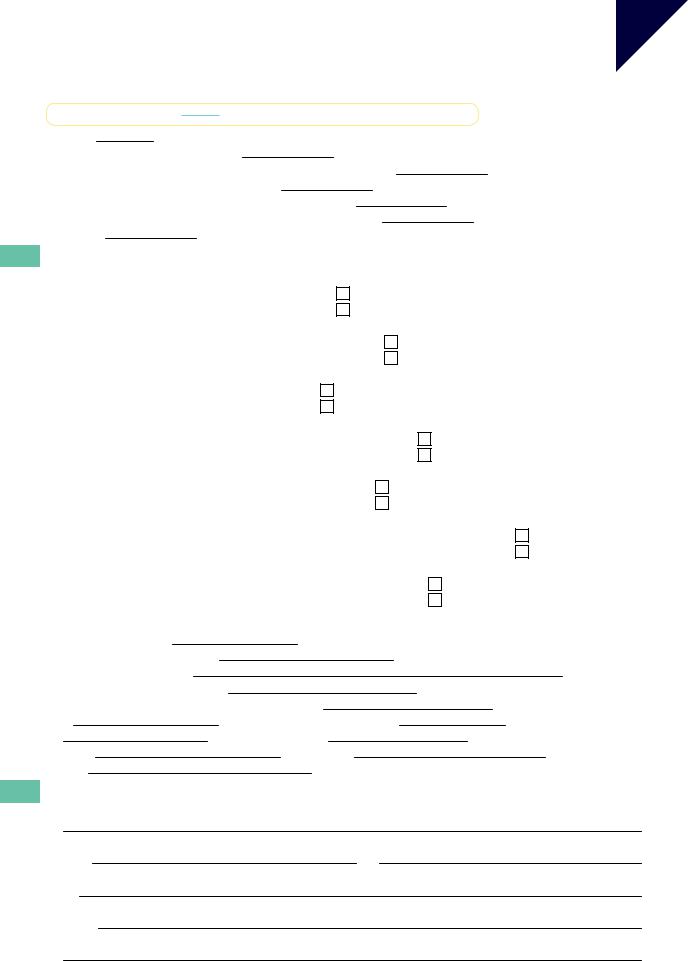
Exercises |
|
|
|
|
|
|
|
Unit |
|||
|
|
|
|
|
|
|
38 |
||||
|
|
|
|
|
|
|
|
||||
|
|
|
|
|
|
|
|||||
38.1 |
Complete the sentences. Choose from: |
|
|
|
|
||||||
|
|
did |
dropped |
|
found |
|
happened |
lost |
was |
went |
|
1 |
If you |
found |
a wallet in the street, what would you do with it? |
|
|
||||||
2 |
Be careful with that vase. If you |
|
it, it would break into small pieces. |
||||||||
3 |
This notebook is very important to me. I’d be very upset if I |
it. |
|||||||||
4 |
I don’t expect to lose my job but if that |
|
, I’d have to find another one. |
||||||||
5 |
We’re thinking about our holiday for next year. If we |
|
to Italy, would you come with us? |
||||||||
6 |
I don’t think he’ll fail the exam. I’d be very surprised if he |
. |
|
||||||||
7 |
If there |
|
|
a fire in the building, would you know how to put the fire out? |
|||||||
38.2 What do you say in these situations?
1 |
Of course you don’t expect to win the lottery. Which do you say? |
||||
|
|
a If I win the lottery, I’ll buy a big house. |
|
|
|
|
|
b If I won the lottery, I’d buy a big house. |
(b is correct) |
||
2 |
You’re not going to sell your car because it’s old and not worth much. Which do you say? |
||||
|
|
a If I sell my car, I won’t get much money for it. |
|
||
|
|
b If I sold my car, I wouldn’t get much money for it. |
|
||
3 |
You oten see Sarah. A friend of yours wants to contact her. Which do you say? |
||||
|
|
a If I see Sarah, I’ll tell her to call you. |
|
|
|
|
|
b If I saw Sarah, I’d tell her to call you. |
|
|
|
4 |
You don’t expect that there will be a fire in the building. Which do you say? |
||||
|
|
a What will you do if there is a fire in the building? |
|
||
|
|
b What would you do if there was a fire in the building? |
|
||
5 |
You’ve never lost your passport. You can only imagine it. |
|
|||
|
|
a I don’t know what I’ll do if I lose my passport. |
|
||
|
|
b I don’t know what I’d do if I lost my passport. |
|
||
6 |
Somebody stops you and asks the way to a bank. Which do you say? |
||||
|
|
a If you go right at the end of this street, you’ll see a bank on your let. |
|||
|
|
b If you went right at the end of this street, you’d see a bank on your let. |
|||
7 |
You’re in a lit. There is an emergency button. Nobody is going to press it. Which do you say? |
||||
|
|
a What will happen if somebody presses that button? |
|
||
|
|
b What would happen if somebody pressed that button? |
|
||
|
|
|
|||
38.3 |
Complete the sentences. |
|
|
||
1 |
I’d be very scared if |
somebody pointed |
(somebody / point) a gun at me. |
||
2 |
I can’t aford to buy a car. If |
|
(I / buy) a car, I’d have to borrow the money. |
||
3 |
If you had a party, who |
|
(you / invite)? |
||
4 |
Don’t lend James your car. If |
|
(he / ask) me, I wouldn’t lend him mine. |
||
5 |
I don’t think Gary and Emma will get married. |
(I / be) amazed if they did. |
|||
6 |
If |
(somebody / give) me $20,000, |
(I / have) a long holiday. |
||
7 |
|
(you / be) nervous if |
(you / meet) a famous person? |
||
8 |
What |
(you / do) if |
(you / be) in a lit |
||
|
|
and |
|
(it / stop) between floors? |
|
38.4 Write sentences beginning If … .
1 We’re not going to take the 10.30 train. (we / arrive too early)
If we took the 10.30 train, we’d arrive too early.
2 We’re not going to stay at a hotel. (it / cost too much) If we , it
3 There’s no point in telling you what happened. (you / not / believe) If I
4 Sally has no plans to leave her job. (it / hard to find another one) If she
5 Kevin is not going to apply for the job. (he / not / get it).
77
